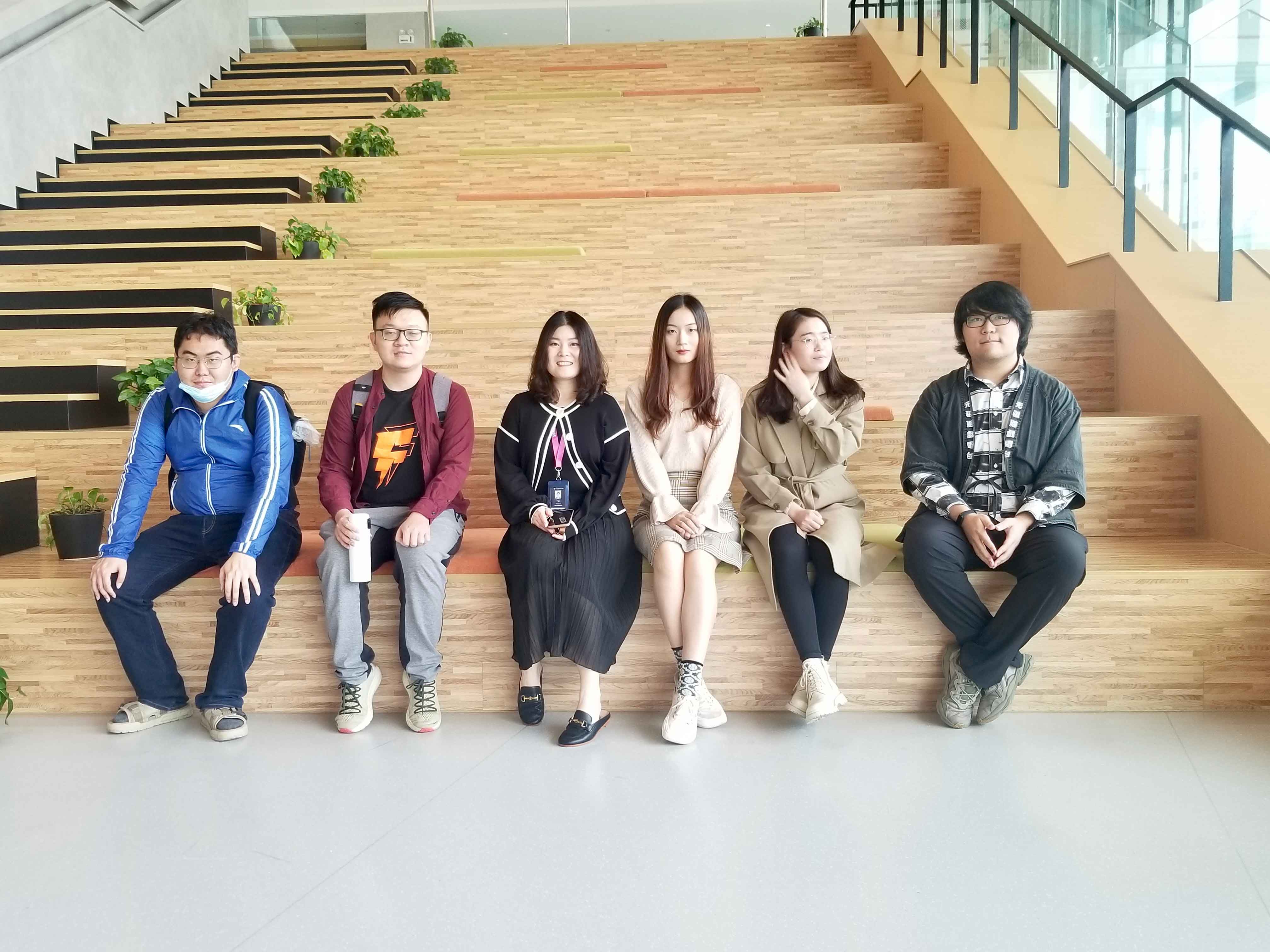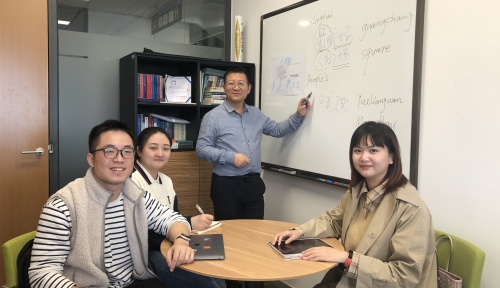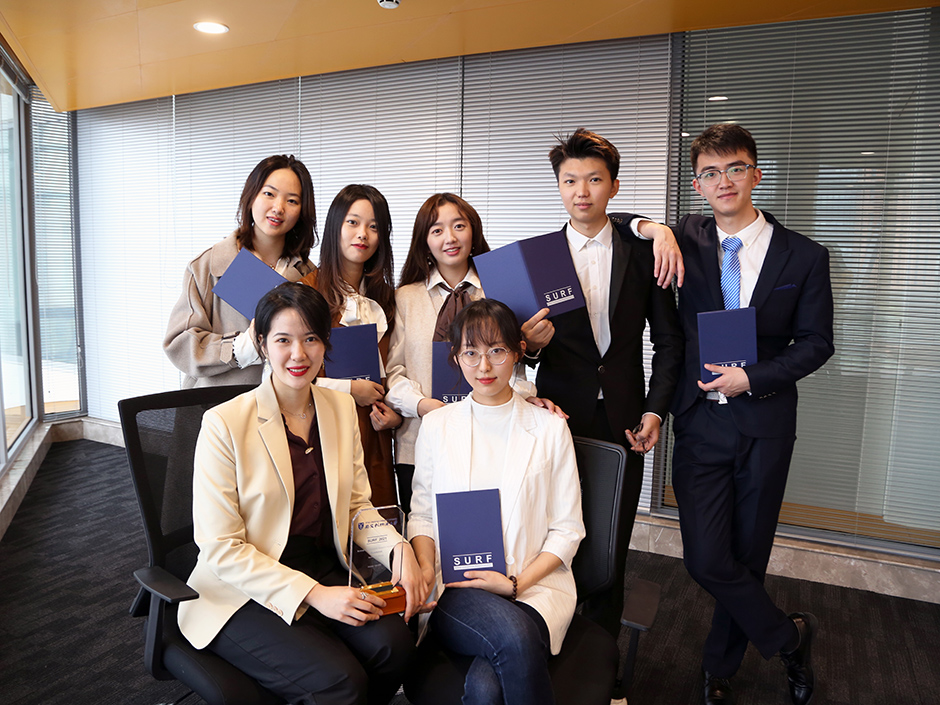25 Jan 2022
Have you ever skipped a game tutorial because it’s heavy, lengthy, and kills all the fun?
To create a better experience for players, Shuangyuan Cao, Ziyi Yu, Ziyi Wu, and Qirong Wang from BA Digital Media Arts, as well as Chunxuan Ji from the School of Advanced Technology focused on answering the question – do players prefer implicit or explicit tutorials and do they learn at the same speed from both instructions?
Fang Liu, Associate Professor at the School of Film and TV Arts (SoFTA), supervised the Summer Undergraduate Research Fellowships (SURF) project.

Left to right: Shuangyuan Cao, Chunxuan Ji, Fang Liu, Ziyi Yu, Qirong Wang, and Ziyi Wu
Implicit versus explicit tutorials
Cao, team leader and initiator of this project, says game tutorials are essential because they serve as a bridge linking the game designer and the players.
“Game designers use tutorials to convey the rules and messages, and players must learn how to play before they can progress,” he says.
Game tutorials can be either implicit or explicit – both are widely used. The distinction between them comes from how the game designer delivers information to the players.

Implicit instruction
Implicit tutorials integrate instructions into the game and are usually interactive; the players can play through the actions that they have to learn.
Explicit tutorials give players detailed instructions at the beginning. They often use texts and cinematics to teach players what they will need to know.

Explicit instruction with text asking users to press the button to jump again
To find out whether players prefer implicit or explicit tutorials, the SURF team developed a mobile game called Little Red Riding Hood: The End of Loop, with two types of instructions.
The game was developed in only five weeks, and after multiple revisions, it was released in Google Play Store. The team then invited players to play and give feedback.
“We designed two questionnaires: one for collecting demographic information, including age, gender, gaming skills, and their favourite games; the other one for collecting the players’ feedback and the scores they achieved,” says Yu.
The results show that implicit tutorials are better received, and players who found the tutorial useful achieved higher scores in the game.

Left to right: Chunxuan Ji, Ziyi Yu, Fang Liu, Ziyi Wu, Shuangyuan Cao (wearing a mask), and Qirong Wang
Cao became interested in game tutorials and user experience design in Year Two. He also developed a game for immersive projection mappings at SoFTA's Digital Media Arts Exhibition in Year Three. It was his first time studying game tutorials and collecting data of user experience.
Despite his strong research interest, Cao wanted to be cartoonist at first. He thought research was only meant for science students, but the courses at SoFTA gave him new insights.
“Introduction to Digital Media Arts made me realise that art and research are closely related. Communication Theory triggered my interest in art theories. After participating in the SURF project, I decide to become an artist-researcher,” he says.
Yu focuses her research more on interaction design. Although game tutorial is not her field of expertise, she learned a lot by participating in the project and working with her teammates.
"The SURF project improved my research and critical thinking skills. As a student in BA Digital Media Arts, I believe I can produce better work after such a valuable journey,” Yu says.
By Wenzhen Li
Translated by Xueqi Wang
Edited by Xinmin Han and Patricia Pieterse
Photos by Xiaogang Li
25 Jan 2022
RELATED NEWS

Guangchang or Square, that is the question
If you ever paid attention to the transport stations in China, you would be surprised by the various translations for just one term. For example, the Chinese...
Learn more

Lithium-sulphur batteries could power the future
Lithium-sulphur (Li-S) batteries, which are lighter, cheaper and more sustainable, could be a promising alternative to lithium-ion (Li-ion) batteries for mob...
Learn more

IBSS students use machine learning to outperform indexes
This summer, seven students from different programmes at Xi’an Jiaotong-Liverpool University teamed up for the Summer Undergraduate Research Fellowships (SUR...
Learn more








